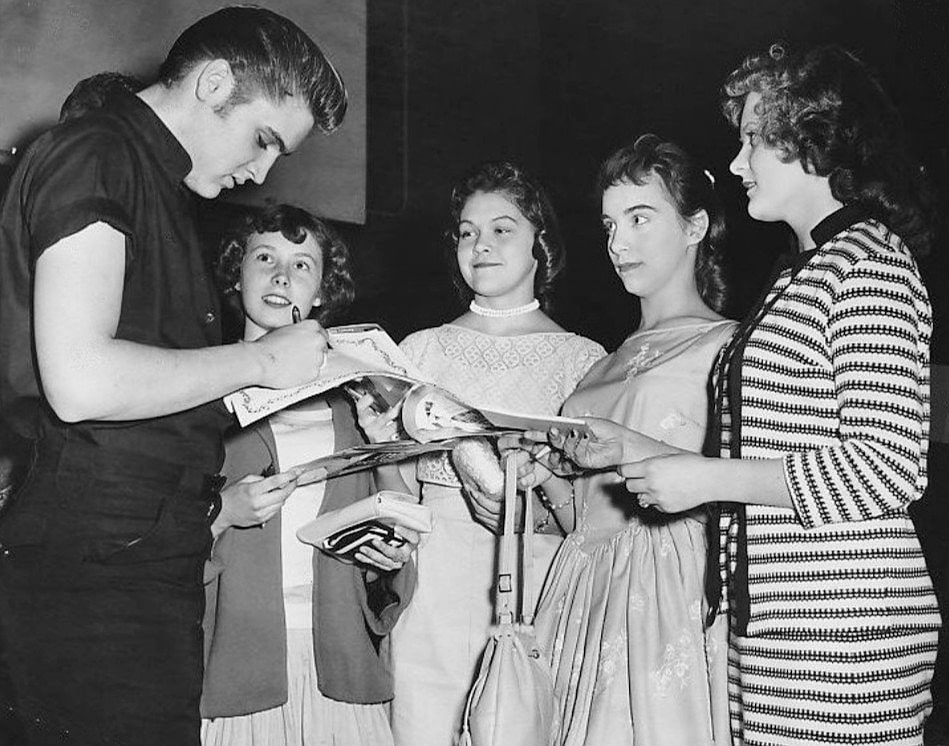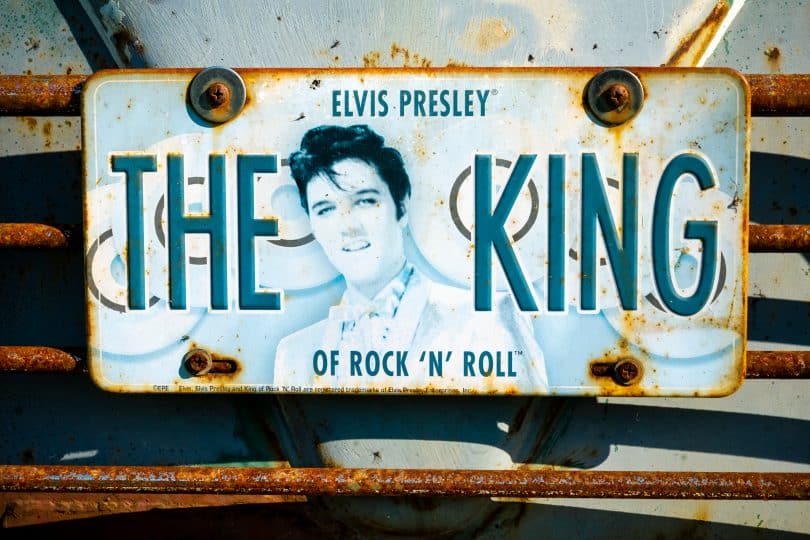Elvis Presley is considered to be one of the greatest musicians of all time. His beautiful voice, shaking hips, and stylish aesthetic will forever be remembered by the entire world. Whilst his career was fruitful, it only lasted until the youthful age of 42 when he sadly died. However, In recent news, Baz Luhrman has just released his new film: an Elvis Presley biopic.
This movie – starring Austin Butler as a very believable Elvis – does a great job at bringing the star back to life and allowing his fans to relive some of his greatest moments. But with each great moment, comes an equally distressing one, as Elvis struggles with addiction. It’s important to remember that with stardom, there are both highs and lows. Let’s take a look at the dark truth of Elvis Presley.
To stay current on everything important happening in the industry, subscribe to The Cannadelics Weekly Newsletter. Also, it’ll get you premium access to deals on cannabis flowers, vapes, edibles, and much more! We’ve also got standout offers on cannabinoids, like HHC-O, Delta 8, Delta 9 THC, Delta-10 THC, THCO, THCV, THCP & HHC, which won’t kill your bank account. Head over to our “Best-of” lists to get these deals, and remember to enjoy responsibly!
Elvis Presley
To understand the dark side of his fame, first we need to understand how Elvis Presley became who he was. Elvis was born in Mississippi in 1935 and had a modest upbringing. Elvis lived in a poor neighbourhood, which meant he was surrounded with a diverse collection of cultures – including many African American families. Whilst slavery was abolished in 1865, it took a long time before racial equality existed in America. In fact, like with much of the world, no one can say with all honesty that it yet does in 2022. Nonetheless, in 1935, when Elvis was born, racial mixing was frowned upon. In his book in 1935, Du Bois writes:
“What are American children taught today about Reconstruction?… He would in all probability complete his education without any idea of the part which the black race has played in America; of the tremendous moral problem of abolition; of the cause and meaning of the Civil War and the relation which Reconstruction had to democratic government and the labor movement today.”
As you can see, the US establishment did not want to accept the guilt of human slavery, or give credit to the work that black communities had done to make America what it was. This was much the same with music. Rock n Roll, blues, jazz – all of these genres of music were born from black culture. Like many other musicians – including Johnny Cash – Elvis Presley was inspired by this sound from a young age and made it his own. Graceland writes:

“Elvis grows up within a close-knit, working class family, consisting of his parents, grandparents, aunts, uncles, and cousins, who all live near one another in Tupelo. There is little money, but Vernon and Gladys do their best to provide for their son… Elvis attends the Assembly of God Church with his family, and the music and preaching register deeply with Elvis Presley. Childhood influences include black blues-men in the neighborhood and country music radio programs enjoyed by his family.”
It’s a difficult debate. Elvis Presley was hugely inspired by this kind of music and the dancing around it, but he was allowed to perform and become famous due to the colour of his skin. However, those he was inspired by, had to sit idly by and do the best they could in a world that did not accept them. Many of his hit songs – including Hound Dog, Mystery Train, Money Honey and Milkcow Blues Boogie – were first sung by black artists. So, the question is, did Elvis steal music from black communities? Or did he shine a light on the greatness of that music? The answer to this is definitely up for debate. Nonetheless, Elvis Presley had a charisma, a moving style and a sound that was unlike anything that the mainstream media had heard before.
His Career
Elvis Presley was bought a guitar by his mother when he was only 11 years old, and from there, he went on to win a talent show at his school in Memphis. He continued to sing and play, until he was signed by a record label. His first single was That’s All Right, which was released in 1954. In 1955, his career started to heat up, with his number 1 hit: Heartbreak Hotel. People loved his goodlocks, sound and promiscuous hips. In response, he signed with RCA Records – thanks to his manager: Tom Parker. Elvis Presley’s manager was an infamous figure:
“Colonel Tom is credited as being the man who made Elvis Presley a star. He received more than half of the income from Elvis’s early success, which at the time was an unprecedented figure for a music manager. The manager negotiated Elvis’s expensive merchandising deals, TV appearances, and acting roles, but turned down offers to allow Elvis to tour overseas, potentially due to his status as an illegal immigrant, which would have been exposed.”
The role of Tom Parker in Elvis’ death has been much debated. Nonetheless, From the 50s to 60s, Elvis’s career went from strength to strength. He became a Hollywood star, a TV host and continued to release some of his greatest ever music: Viva Las Vegas (1964) and Girls! Girls! Girls! (1962). He also married Priscilla, the mother of his children and true love. Presley went on to win three grammy awards, the lifetime achievement award and had 18 number 1 hits. He is considered by many as the best solo artist that ever lived.
The King’s Fall
Every bright star will inevitably one day go out. Elvis Presley, at age 42, was found dead in his Memphis mansion. It was 16th August, 1977. At first, it was released to the press that he had died from a natural heart attack, not triggered or involving drugs. However, it was soon revealed that drugs had played a major part and, in fact, Elvis Presley had been suffering from a prescription drug addiction for many years. PBS writes:

“When the toxicology report came back several weeks later, however, Elvis’ blood was found to contain very high levels of the opiates Dilaudid, Percodan, Demerol, and codeine — as well as Quaaludes.”
Elvis Presley, like many others, had an opioid addiction. A drug that is highly addictive due to its pain relief. It can be very hard to wean yourself off it once you get used to it. Elvis was given an illegal amount of prescribed drugs by his personal physician, “Dr Nick”. Dr Nick went on to give Elvis Presley thousands of opioids and amphetamine drugs to help him through arduous tours and performances. This became an addiction. Dr Nick, when being trialled for his irresponsible dealings with Presley, said that Elvis…
“felt that by getting drugs from a doctor, he wasn’t the common everyday junkie getting something off the street.”
Unfortunately, Elvis, like many others, was struck by the power and hollowness of fame. What began as a passion, became work. Elvis Presley was made to perform like a puppet, and was fed whatever drugs would keep him from cancelling a show. His manager, Tom Parker, is highly responsible for this. He was an avid gambler, and had a deal with the Las Vegas Hilton that Elvis played a great deal of his shows at. He owed the casino around 30 million dollars. The deal was that they would eradicate all of Parker’s debts, if Elvis Presley continued to play. Elvis played there for months without the knowledge of this deal. By the end of Elvis’ life, his addiction and long tours meant he really didn’t have that many people around him left that he could trust. Priscilla had divorced him after Elvis rejected her plea for him to get medical help. Elvis History writes:
“In 1976, at the age of 41, he worked tirelessly on the road—122 concerts in 74 cities. In the first six months of 1977, he kept up the tempo with 54 shows in 49 cities. That frenetic pace fueled his drug habit and certainly contributed to his early death.”
In his last ever performance on June 26th, 1977 in Indianapolis, there were 18,000 people present. From watching the video, you can see that Elvis still had the same natural ability and charm. It is, however, obvious to see how the drug addiction had changed him. It became more usual to see him slur his words and mumble his crowd interactions out. He was a different person to who he had been, but he still had the undoubtable talent within him.
Conclusion
Elvis Presley is one of the most adored and successful solo musicians ever. The music he played will forever be listened to for centuries to come. The sad truth is that his death, unlike his career, was not extraordinary. In the history of fame, it was a very usual demise. He, like many other musicians, was swallowed by the world of music business and fame, packaged, used, and thrown back up again. The young boy from Mississippi that loved to play and sing was never lost. But as time went on, the drug use – brought about by deep unhappiness – made that version of him harder to find.
Welcome all! Thanks for dropping by Cannadelics.com, a top offering for comprehensive news covering the burgeoning cannabis and psychedelics industries. Stop by daily for a dose of news on these dynamically changing fields, and sign up for The Cannadelics Weekly Newsletter, so you’re up on everything important going on.









